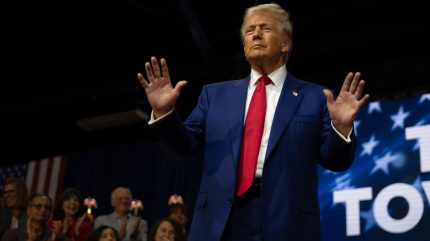
“We don’t sleep very soundly,” an Italian MEP said to EuroNews in January of 2024.
She was referring to the looming prospect of Donald Trump becoming the Republican nominee and eventually making his way back into the White House. The real panic arrived in June, after Biden’s now-infamous poor debate performance that led to his replacement on the ticket by Vice President Kamala Harris.

Discover B2B Marketing That Performs
Combine business intelligence and editorial excellence to reach engaged professionals across 36 leading media platforms.
Now that the election is just a few weeks away, nerves in Europe are jangling. There are two main concerns regarding a second Trump presidency on the other side of the Atlantic: Ukraine and the economy. Efforts to prepare have been varied, and some say have come far too late to make a significant difference if Trump wins the election.
What has Trump said?
Regarding the war with Ukraine, Trump has said he will end the war in just one day. The desire for a quick resolution, many officials have pointed out, would mean big concessions to Russia that would constitute a blow for Ukraine. Steven Cheung, Trump’s campaign communications director, also said the former president believes “European nations should be paying more of the cost of the conflict”.
On a podcast published yesterday (18 October), Trump said “[Zelensky] should never have let that war start. The war’s a loser.” He added that President Joe Biden had “instigated that war”.
In Europe, the biggest fear regarding Ukraine is that Trump will cut off crucial defence spending from NATO and perhaps retire the US from the organisation altogether.

US Tariffs are shifting - will you react or anticipate?
Don’t let policy changes catch you off guard. Stay proactive with real-time data and expert analysis.
By GlobalDataA report by the New Diplomacy Project has suggested that Europe, the UK and Ukraine could “Trump-proof” collective security through the creation of a “NATO bank” that would help defence spending. It would be a multilateral lending institution that the report says could “save nations millions on essential equipment purchases, offer low interest rates on loans to alliance members and introduce a new line of financing with longer repayment timeframes”. It also suggests that the UK should strengthen its security agreements with Germany, the EU and France.
In August, the European Commission set up a task force to prepare for a potential Trump sequel. The team is also working to determine the implications of a Kamala Harris presidency and what policy changes might start to form post-November.
Regarding the economy, Trump hasn’t tired of waving the tariff-stick in the EU’s face. He has said he would impose tariffs on China ranging between 60% to 100% while having a 10% rate across the board on any imports from other countries.
“Our allies have taken advantage of us. More so than our enemies […] Our allies are the European Union. We have a trade deficit of $300bn with the European Union,” Trump has warned.
In an interview with Bloomberg’s editor-in-chief John Micklethwait, Trump said that “the higher the tariff, the more likely it is that the company will come into the United States and build a factory in the US so it doesn’t have to pay the tariff” – essentially replacing trade with what he hopes will be a surge in FDI investments. Micklethwait was quick to respond that this would take “many, many years”.
The proposed import tariffs have not just worried EU officials; they have also raised questions in the US over how they would affect consumers. While Trump sees import tariffs as a way to grow the economy, protect jobs and increase tax revenue, this has been “almost universally regarded by economists as misleading”.
Speaking to ABC News, economists said the tariff proposals would trigger a global trade war and limit opportunities for US exporters. There could also be a surge in local production that could increase hiring and shield companies from foreign competition. However, the same economists said that that the consequences would far outweigh the potential benefits.
Economists have also said the cost of higher tariffs would be passed onto the US consumer.
In preparation, the EU has made a list of US goods that it would consider targeting if Trump follows through on the promise of high tariffs. Bloomberg reported that new levies would only be enacted as retaliation against a move by Washington, according to people familiar with the matter.
During Trump’s first term, the EU was caught off guard when he introduced tariffs for European steel and aluminium exports. Since then, the bloc has adopted tools to help them respond to economic coercion.
Ready or not
“It is nearly impossible to prepare for a [Trump presidency] because the main issue is [Trump’s] unpredictability,” a senior German official told Time in June. While preparing for the prospect of a Trump presidency seems necessary, it seems like there is only so much Europe can do. What is certain is that if Trump wins, no amount of preparation can completely shield Europe from the whims of the president of the continent’s closest ally.





